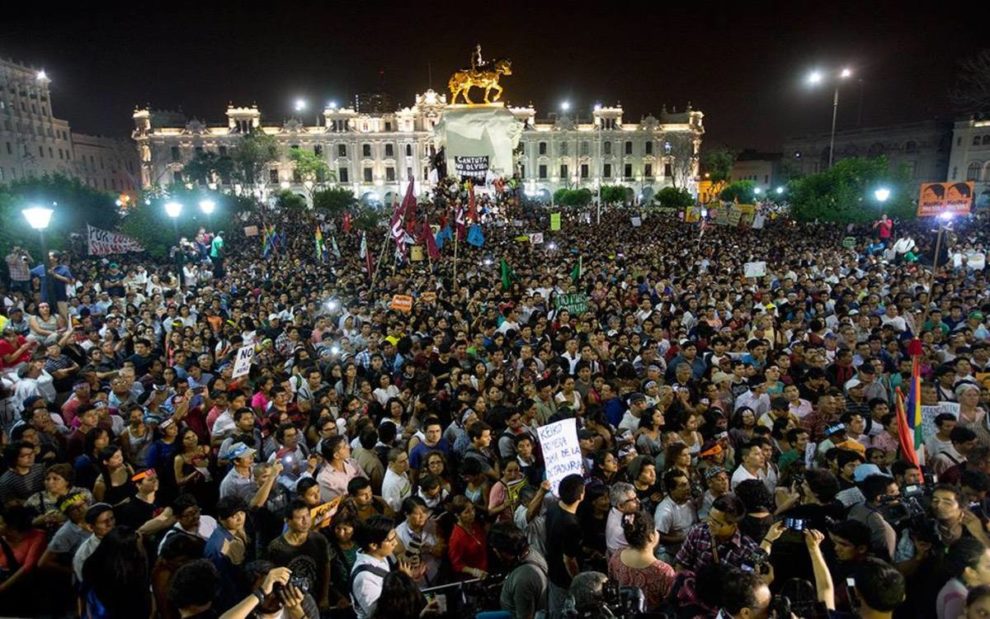Students and lawyers are arrested on charges of belonging to the terrorist group Sendero Luminoso, which no longer has any real power in Peru.
Between 1980 and 2000, the communist group “Sendero Luminoso” (Shining Path) brought chaos and terror to Peru’s society. More than 30,000 murders are attributed to this group, including acts such as collective massacres, terrorist attacks, public executions, and various similar attitudes, being one of the most notoriously barbaric terrorist groups and most feared organizations in Latin America. However, the victory of the Peruvian State against this group is undeniable.
The Sendero Luminoso’s leader, Abimael Guzman, popularly known as “Presidente Gonzalo”, was arrested in 1992 and since then the organization’s strength has gradually decreased until the group was considered almost completely extinct in the 2010s. The few remaining members of the guerrilla joined drug trafficking factions and abandoned political militancy in favor of organized crime, and today there is no sign of civil conflict between government forces and communist guerrillas, just the mere legal confrontation between the state and drug trafficking.
However, although experts point out the current absence of guerrillas, this is not the official narrative adopted by the Peruvian State, which insists on spreading the existence of a threat from the Sendero Luminoso. In December, during an operation in the country’s capital, the Peruvian National Police arrested 72 militants on charges of being members of the Sendero Luminoso. The evidence that justifies the operation is weak and inconclusive. In fact, many people today have connections with ex-rebels (who have already served their judicial sentences) and their families and form small agglutinations of “supporters” of the old militancy in large cities.
However, these groups never committed any terrorist attack or other crime – some even express an interest in adhering to democratic institutional politics with the possible formation of a political party, which is quite different from the “Gonzalo Ideology” mentality that guided the guerrillas in the past decades. The largest of these “support” groups is Movadef (Movement for Amnesty and Human Rights), an organization of lawyers and students that advocates respect for human rights when punishing terrorists. The 72 people arrested in December were members of Movadef.
Obviously, every state has the right to take preventive actions against the formation of new terrorist groups. The problem, however, is to create a fake enemy as an act of propaganda and, as a result, to arrest people and deprive them of their most basic rights. Under the charge of terrorism, anyone can be arrested for national security reasons, with their rights suspended. Therefore, the arrest of people with such an accusation should be done with extreme caution and in no way can it be practiced when dealing with dubious cases, where there is no certainty that the accused are actually involved in terrorist activities.
This has a simple explanation: by creating a false flag, which announces a security crisis scenario, the government can gain support and popularity by proposing a solution to the problem. This could save Peru from the serious institutional crisis affecting the country. The Peruvian situation today is so delicate that the country had three different presidents only in November of last year. Currently, who rules the country is Francisco Sagasti, who became the fourth president of the Republic in four years.
The crisis was particularly aggravated by the overthrow of President Martín Vizcarra, who had widespread popular support and was removed after a controversial impeachment process that many analysts accused was carried out with many illegalities. In fact, the Vizcarra government was marked by strong policies to combat corruption and drug trafficking. After his fall, however, Peru fell into serious political and social instability. Thousands of protesters filled the streets of Lima to protest the impeachment and the wave of demonstrations continues today, albeit on a smaller scale.
Interestingly, shortly after this period of changing presidents, the crusade against the Sendero Luminoso’s “supporters” in Peru began. The main target of the organization is the Movadef – an organization that does not encourage armed struggle, but the amnesty of guerrillas and respect for their fundamental rights. In December, just after the arrest of dozens of Movadef members (most of whom were students), Peruvian police arrested lawyer Alfredo Crespo, who had defended the Sendero Luminoso’s leader during the judicial process. In the same sense, the charges against the lawyer are obscure. In addition, several other Movadef members were later arrested, totaling almost a hundred prisoners.
Apparently, the government is equating Movadef with the Sendero Luminoso and considering human rights activists as terrorists. It is curious that this started right after the institutional crisis, as it seems to be an excellent political instrument. Considering the popular rejection against the Sendero Luminoso which caused so much suffering to the Peruvian people, inventing a new terrorist threat and starting a national crusade against the militants of an organization sounds like an excellent tactic to unify the country, remove the media focus from political scandals and justify exception measures.
In addition, while lawyers and students are arrested, real remnants of the former guerrillas continue to participate freely in drug trafficking organizations in the countryside without any national crusade.
Lucas Leiroz, a research fellow in international law at the Federal University of Rio de Janeiro.
